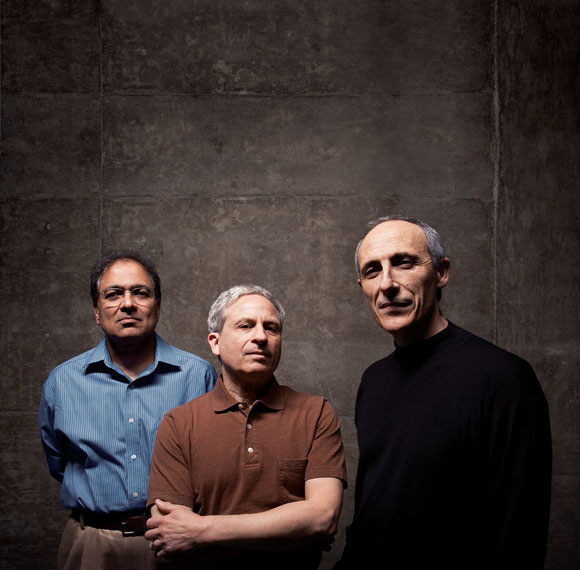Wired Magazine: Difference between revisions
From VistApedia
Jump to navigationJump to search
DavidWhitten (talk | contribs) Created page with "Image:www.wired.com+wp-content+uploads+archive+images+slideshow+magazine+1505+FF_raves_worldvista_f.jpg credit By Thomas Goetz Photograph By Sian Kennedy Medicine: The Cod..." |
DavidWhitten (talk | contribs) No edit summary |
||
| Line 1: | Line 1: | ||
WorldVistA was honored in the 2007 Wired Magazine Rave Awards | |||
( text here from https://www.wired.com/2007/04/feat-raves/ ) | |||
[[Image:www.wired.com+wp-content+uploads+archive+images+slideshow+magazine+1505+FF_raves_worldvista_f.jpg]] | [[Image:www.wired.com+wp-content+uploads+archive+images+slideshow+magazine+1505+FF_raves_worldvista_f.jpg]] | ||
credit By Thomas Goetz | |||
Photograph By Sian Kennedy | * credit By Thomas Goetz | ||
* Photograph By Sian Kennedy | |||
Medicine: The Code Doctors | Medicine: The Code Doctors | ||
[[K. S. Bhaskar]], [[Maury Pepper]], and [[Joseph Dal Molin]] | | |||
WorldVistA In an age when nearly every piece of information has gone digital, one crucial category remains stubbornly analog: your medical records. Less than 25 percent of US health care providers use electronic records; the rest use file folders bulging with paper. Three technologists, along with an army of open source coders, are out to change that. Dubbed WorldVistA EHR, their software will make it easy for hospitals and doctors to trade in dead trees for bits and bytes. That efficiency could save thousands of lives — and millions of dollars — every year by eliminating redundant questionnaires, incomplete files, and unnecessary treatments. The project began with a medical-records program called VistA at the US Department of Veterans Affairs (the VA had the name long before Microsoft). That system helped transform the VA from a medical backwater into the country’s best-run, most cost-effective health care organization. The WorldVistA founders took the VA’s public-domain software and turned it into a collaborative project, with all the hallmarks of open source: The software doesn’t cost much to implement, and a large community stands ready to offer support. It’s also surprisingly easy for hospitals and clinics large and small to use, which means it could become the de facto standard in the US, and perhaps beyond. "Our goal," WorldVistA COO K. S. Bhaskar says, "is nothing short of world domination." | |||
Revision as of 21:33, 9 July 2021
WorldVistA was honored in the 2007 Wired Magazine Rave Awards
( text here from https://www.wired.com/2007/04/feat-raves/ )
- credit By Thomas Goetz
- Photograph By Sian Kennedy
Medicine: The Code Doctors
K. S. Bhaskar, Maury Pepper, and Joseph Dal Molin |
WorldVistA In an age when nearly every piece of information has gone digital, one crucial category remains stubbornly analog: your medical records. Less than 25 percent of US health care providers use electronic records; the rest use file folders bulging with paper. Three technologists, along with an army of open source coders, are out to change that. Dubbed WorldVistA EHR, their software will make it easy for hospitals and doctors to trade in dead trees for bits and bytes. That efficiency could save thousands of lives — and millions of dollars — every year by eliminating redundant questionnaires, incomplete files, and unnecessary treatments. The project began with a medical-records program called VistA at the US Department of Veterans Affairs (the VA had the name long before Microsoft). That system helped transform the VA from a medical backwater into the country’s best-run, most cost-effective health care organization. The WorldVistA founders took the VA’s public-domain software and turned it into a collaborative project, with all the hallmarks of open source: The software doesn’t cost much to implement, and a large community stands ready to offer support. It’s also surprisingly easy for hospitals and clinics large and small to use, which means it could become the de facto standard in the US, and perhaps beyond. "Our goal," WorldVistA COO K. S. Bhaskar says, "is nothing short of world domination."
